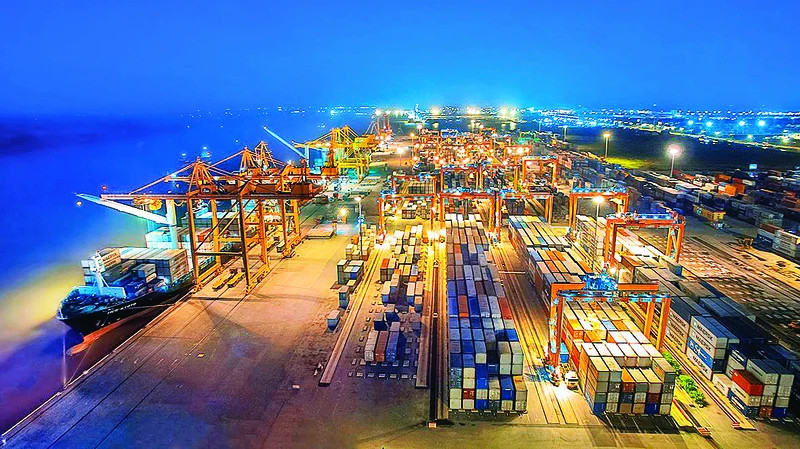After a year full of fluctuations with more challenges than opportunities, Vietnam has completed the basic growth targets. Most sectors of the economy have improved, helping the overall picture to brighten towards the end of the year. The macro economy is basically stable, inflation is controlled, major balances are ensured, production and business activities have changed positively, regaining growth momentum like the pre-pandemic period.
Breakthrough from growth drivers
According to data from the General Statistics Office, the industrial production sector has recovered positively; in which, the processing and manufacturing sector has a higher growth rate than the general growth rate of the whole industry, becoming the driving force for the growth of the whole economy. Specifically, in November 2024, the industrial production index (IIP) increased by 2.3% compared to the previous month and increased by 8.9% compared to the same period last year; notably, the IIP index of the processing and manufacturing industry increased by double digits at 11.2%.
In the 11 months, the IIP of the entire industry increased by 8.4% compared to the same period; the IIP of the processing and manufacturing industry increased by 9.7%, an impressive growth rate compared to the respective 0.9% and 1.0% increases in the same period in 2023. The industrial production situation of localities across the country also improved strongly with 60/63 localities recording an increased production index.
The recovery of production and business activities has positively impacted the business registration situation of enterprises. As of November 2024, on average, nearly 20,000 enterprises were either newly established or resumed operations per month, an increase of 7.4% over the same period last year.
The number of newly registered enterprises increased again in the last months of the year, showing that enterprises and investors have strengthened their confidence in the economic prospects as well as the socio-economic management of the government.
Export momentum has also grown strongly. As of the end of November 2024, agricultural exports have exceeded the set target and increasingly accounted for a high proportion of total export turnover, contributing significantly to GDP growth.
The positive point is that the current export market signal is relatively good, orders have returned. As of November 2024, state budget revenue exceeded the estimate, with domestic revenue having increased by 16.8% over the same period last year. According to General Statistics Office Director Nguyen Thi Huong, the high increase in state budget revenue reflects the positive recovery of production and business activities.
2024 is also a successful year for Vietnam in attracting foreign investment. Deputy Minister of Planning and Investment Tran Quoc Phuong said that foreign investors and experts all assessed the investment market in the world as gloomy, but foreign investment in Vietnam is very positive.
This is reflected in the results of attracting foreign direct investment (FDI) in 2024, reaching a high level in recent years, while implemented capital continued to maintain growth momentum compared to the same period and many projects continued to expand production scale. This is proof that the operation of this sector is very effective, and Vietnam is an important destination for FDI capital flow.
In addition to growth achievements, inflation will continue to be controlled according to the target in 2024. Ms. Nguyen Thu Oanh, Director of the Price Statistics Department (General Statistics Office), commented that one of the factors helping Vietnam control inflation according to the target set by the National Assembly is that world inflation has cooled down, reducing pressure on domestic commodity prices.
In addition, to control inflation, the government has directed ministries, branches and localities to resolutely implement many solutions: ensuring smooth supply, circulation, and distribution of goods, especially essential goods for people’s lives; focusing on price management and operation during natural disasters, storms and floods; and promptly issuing national reserve goods to support and provide relief to people, especially at the time of storm No. 3 (Yagi) and storm circulation causing damage in the northern provinces.
Monetary policy has been actively, flexibly, promptly and effectively managed, also contributing to controlling inflation. In addition, the government will continue to implement policies to support taxes, fees, and charges for people and businesses, which will help reduce costs for businesses and people in 2024.
Promoting the private economy
Forecasting the outlook for 2025, Dr Nguyen Huu Tho, Head of the Economic Analysis and Forecasting Department (Central Institute for Economic Management - CIEM), is optimistic that the production and business situation will continue to improve. The positive point is that the export market still maintains a good growth trend thanks to the recovery of global trade and the implementation of signed free trade agreements. Regarding domestic consumption dynamics, the purchasing power of Vietnamese people is forecast to continue to increase, but the increase is not much because the income of workers has not made a breakthrough.
From the analysis of trends in 2025, CIEM recommends that the government should strengthen the removal of barriers when developing documents guiding the implementation of newly issued laws; at the same time, promote reform of business procedures according to market signals, focus on removing institutional bottlenecks to unblock resources for development.
In addition to the task of investing in infrastructure to increase regional and inter-regional connectivity as well as promote growth, it is necessary to focus on developing "soft" infrastructure with the target of achieving about 40% of online applications and digital enterprises.
In Resolution No. 158/2024/QH15 on the Socio-Economic Development Plan for 2025, the National Assembly clearly stated the need to strongly promote new growth drivers including green economy, circular economy, knowledge economy, sharing economy, night economy, etc.
Emphasising the growth driver of the private economy, Resolution No. 158/2024/QH15 stated the task of creating a favourable environment, encouraging the strong development of private enterprises as a truly important driving force of the economy, promoting the development of large national enterprises, striving for the private economic sectors contribution to GDP to reach about 55% by 2025.
In the context of the business community facing many difficulties in the process of recovery and development after the COVID-19 pandemic, Dr Le Duy Binh, Director of Economica Vietnam, said that increasing private investment is a great opportunity for the economy to achieve high and sustainable growth.
To increase investment, there needs to be a favourable environment for businesses to confidently demonstrate their vision, aspirations, and ambitions; there needs to be a legal framework and culture that encourages businesses to dare to take risks, expand their business, think big, do big, and invest big.
“Businesses also need a good institutional environment with clear legal regulations, thereby creating a safe business environment, low compliance costs, and high predictability, helping businesses to implement their business ideas conveniently and safely,” emphasised Binh.
The results of socio-economic development in 2024 have affirmed a strong recovery, reflecting the people’s trust and consensus in the policies of the Party and the State. That is an important foundation, creating momentum for the economy to make a breakthrough in 2025 — the final year of the 2021-2025 planning term.
















